Uc davis math placement - Study guides, Class notes & Summaries
Looking for the best study guides, study notes and summaries about Uc davis math placement? On this page you'll find 16 study documents about Uc davis math placement.
Page 2 out of 16 results
Sort by
uc davis ; math placement exam 2024 with 100% correct answers PSC 041 Final Exam UC Davis 2024 with 100% correct answers
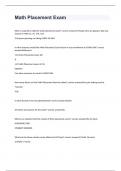
-
Math Placement Exam 2024 with verified solutions
- Exam (elaborations) • 2 pages • 2024
- Available in package deal
-
- $11.49
- + learn more
Who is required to take the math placement exam? correct answers1) People who are going to take any classes in Math 12, 16, 17A, 21A 2) Anyone planning on taking CHEM 2A/2AH In what Instance would the Math Placement Score factor in your enrollment to CHEM 2AH? correct answersPathway 6: -UC Chem Placement exam 30+ & -UC Math Placement exam of 45+ together. Can allow someone to enroll in CHEM 2AH. How many times can the Math Placement Exam be taken? correct answersOnce per testing s...
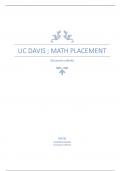
-
uc davis ; math placement
- Exam (elaborations) • 12 pages • 2024
-
- $13.49
- + learn more
uc davis ; math placement properties of exponents - whole number exponents: b^n = b • b • b... (n times) - zero exponent: b^0 = 1; b ≠ 0 - negative exponents: b^-n = 1/(b^n); b ≠ 0 - rational exponents (nth root): ^n√(b) = 1/(b^n); n ≠ 0, and if n is even, then b ≥ 0 - rational exponents: ^n√(b^m) = ^n√(b)^m = (b^(1/n))^m = b^(m/n); n ≠
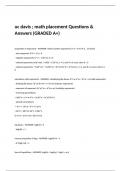
-
uc davis ; math placement Questions & Answers (GRADED A+)
- Exam (elaborations) • 8 pages • 2024
- Available in package deal
-
- $12.99
- + learn more
properties of exponents - ANSWER- whole number exponents: b^n = b • b • b... (n times) - zero exponent: b^0 = 1; b ≠ 0 - negative exponents: b^-n = 1/(b^n); b ≠ 0 - rational exponents (nth root): ^n√(b) = 1/(b^n); n ≠ 0, and if n is even, then b ≥ 0 - rational exponents: ^n√(b^m) = ^n√(b)^m = (b^(1/n))^m = b^(m/n); n ≠ 0, and if n is even, then b ≥ 0 operations with exponents - ANSWER- multiplying like bases: b^n • b^m = b^(n + m) (add exponents) - dividing like b...
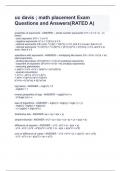
-
uc davis ; math placement Exam Questions and Answers(RATED A)
- Exam (elaborations) • 6 pages • 2024
- Available in package deal
-
- $9.99
- + learn more
second degree equations - ANSWER -solved by factoring or the quadratic formula absolute value - ANSWER -equivalent to two equations without the absolute value sign > e.g. |x + 3| = 7 → +(x + 3) = 7 or -(x + 3) = 7 solving linear inequalities - ANSWER -can be treated like a linear equation, however, when multiplying or dividing both sides of an inequality by negative numbers requires the inequality sign to be reversed solving absolute value inequalities - ANSWER -- with absolute va...
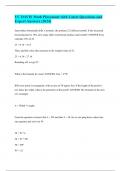
-
UC DAVIS Math Placement with Latest Questions and Expert Answers (2024)
- Exam (elaborations) • 5 pages • 2024
-
- $7.99
- + learn more
UC DAVIS Math Placement with Latest Questions and Expert Answers (2024) A ball was kicked into the air from a balcony 20 feet above the ground, and the ball's height above the ground, in feet, t seconds after the ball was kicked was h(t) = 20 − 16t2 + 32t. What was the maximum height, in feet, of the ball above the ground after it was kicked? ANSWER h(t) = 20-16t^2 + 32t h(t) = -16t^2 +32+20 x= -b /2a = -(32)/2(-16) = -32/-32 = 1 Plug one in the original equation. h(1) = -16(1)^2 +32+20...

How did he do that? By selling his study resources on Stuvia. Try it yourself! Discover all about earning on Stuvia


